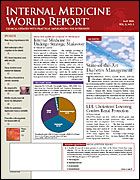Publication
Article
Internal Medicine World Report
Anticoagulation Therapy Inadequate in Women with AF
Author(s):
From the American Stroke Association
Kissimmee, Fla—Elderly patients, but especially women, with atrial fibrillation (AF) have low rates of anticoagulation, according to a retrospective study by Vibhuti Singh, MD, of the University of South Florida, St. Petersburg, which was presented at the American Stroke Association International Stroke Conference 2006.
Despite the existence of clear guidelines that recommend anticoagulant therapy to reduce the risk of stroke after AF, anticoagulation rates have been historically low for women, particularly the elderly who are at especially high risk of stroke, he said.
Records from 347 patients with paroxysmal and persistent AF were reviewed. A total of 131 of the patients were women, of whom 79 were aged ≥70 years.
P
P
Of these women, only 62% were taking warfarin (Coumadin), compared with 76% of the 216 men. And only 49% of the subgroup of women aged ≥70 years were chronically anticoagulated, compared with 80% of their younger counterparts ( <.05). The rate of warfarin use among the elderly women was also lower than among the 11 elderly men (61%; <.05).
“Various reasons were given for the nonuse of warfarin in the elderly women,” said Dr Singh, including physician deferral because of advanced age (37%), minor bleeding and bruising (20%), falls or gait issues (15%), patient choice (17%), major bleeding (6%), and problems obtaining laboratory tests (5%).
“It is surprising that actual bleeding is not the commonest reason for such deferral,” said Dr Singh. “Rather, physicians’ or patients’ choice [or fear] seem to be the most important factors. Addressing these correctable factors can potentially lead to a dramatic reduction in the risk of stroke in the elderly women.”
Stroke
Dr Singh’s data were supported by a study published in (2006;37:1075-1080), in which Boston researchers followed the treatment of 405 patients with AF (aged ≥65 years) throughout their hospital stays.
Only 51% of these patients were started on warfarin. Various contraindications were cited in 98% of cases. The most common reasons given by physicians for not prescribing warfarin were current or chronic bleeding episodes (33%), mostly gastrointestinal; spontaneous falls that resulted in fracture or head injury (32%); and patient refusal to take the drug or a history of not taking prescribed drugs (14%).
“The unexpected finding was that 23% of these patients had received the drug previously and were intolerant to it,” explained lead investigator Elaine M. Hylek, MD, of Boston University. “There is no effective treatment option for these patients.”
The study illustrates the challenges that physicians and patients face when trying to apply recommendations derived from clinical trials to older patients with AF in real-world practice, said Dr Hylek. “A more precise definition of the real risk of each contraindication may increase the number of patients taking the drug,” she said.
KEY POINTS
Current guidelines recommend anticoagulant therapy to reduce the risk of stroke after AF.
A large number of elderly women are not receiving an anticoagulant prescription.





